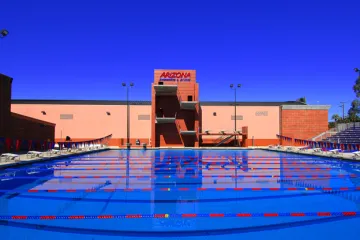The CACTI Blog: Swim Camp for Children with Autism Spectrum Disorder

By Sylvia Badger, 2022-2023 Undergraduate Certificate In Developmental Disabilities
When I joined the Sonoran Center for Excellence in Disabilities undergraduate certificate program here at the University of Arizona, I knew I wanted to find something that I connected with. I have a personal connection to developmental disabilities, and I was eager to see what more I could learn from other people through their own experiences, as well as through research. For my scholarly project, I identified organizations locally and nationally that benefit those with disabilities and conducted research on the relationship between developmental disabilities and physical education. Under Professor Austin Duncan, I assisted with the development of an intervention program that will allow these young adolescents to maintain a healthy lifestyle, as well as interact with those who are similar to them.
When kids reach adolescence, it is important for them to realize the benefits of maintaining a healthy lifestyle through physical activity. However, this may often be challenging to teenagers with disabilities, especially with those who have been diagnosed with autism spectrum disorder, or ASD. Individuals with ASD often have difficulty interacting with their peers in a classroom setting. In physical education classes in the United States, adolescents are often encouraged to reach their full potential with competitive activities leading to after school extracurriculars, such as football, basketball, or swimming. Adolescents with ASD are often cast aside, and the competitive nature of sports may discourage them from engaging with their classmates. This can lead to isolation and an unwillingness to participate in physical activity in the long run, which can be detrimental to their health as they age. (Arnell et al., 2018).
In addition, parents who seek to engage their kids in a program promoting physical activity may stumble upon many barriers, such as work, finances, and family. One-on-one classes are often expensive, and such classes do not allow the child to engage with other individuals with autism. The University of Arizona is seeking to pull away some of these barriers with a fun and interactive swim camp tailored to young children and adolescents with ASD.

Image Description: The open-lane swimming pool at the University of Arizona Recreation Center. Photo taken by Lloyd Construction Company.
The Sonoran Center is partnering with Campus Recreation and the Autism Society of Southern Arizona to launch a pilot swim camp for adolescents with autism (a pilot program is a small-scale, short-term experiment that helps an organization learn how a large-scale project might work in practice). This program promotes a fun yet intimate environment for these individuals to interact with each other, have fun, and learn how to swim. In Arizona especially, due to the extreme heat in the summer, it is crucial to learn how to swim; and this pilot program allows kids to meet twice a week for 8 weeks after school to develop this skill. The aim of this program is to teach children with ASD not only how to swim, but also how to engage with other individuals with ASD, who they may not get to be around on a regular basis. If successful, the organization hopes to expand the swim camp to other regions of Arizona.
This pilot program officially launched in the summer of 2023, and I am excited to see where this will go. I myself have a younger brother who has ASD, and getting him to stay active has been a challenge. There are very few athletic organizations in general that cater to children with ASD; as he gets older, these programs will become more sparse. Having a program like this in place allows for other children with ASD to be able to engage within their community, as well as understanding the benefits of exercising at a young age to promote healthy, lifelong habits.
Editor’s Note: In the time since this blog was written, the first phase of the pilot swim camp was completed. Read more in this article.
References:
Arnell, Susann, et al. “Perceptions of Physical Activity Participation Among Adolescents With
Autism Spectrum Disorders: A Conceptual Model of Conditional Participation.” Journal of Autism and Developmental Disorders, vol. 48, no. 5, Springer Science+Business Media, May 2018, pp. 1792–802. https://doi.org/10.1007/s10803-017-3436-2.
The CACTI Blog features the voices of our interdisciplinary trainees and Community Advisory Council members as they highlight diverse images of people with disabilities and provide community information and advocacy on disability issues. Check Out The CACTI Blog
